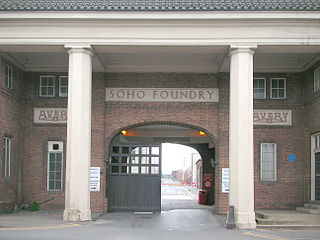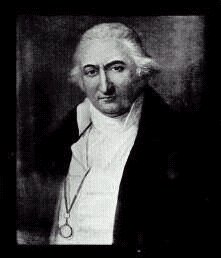
Erasmus Robert Darwin was an English physician. One of the key thinkers of the Midlands Enlightenment, he was also a natural philosopher, physiologist, slave-trade abolitionist, inventor, and poet.

James Watt was a Scottish inventor, mechanical engineer, and chemist who improved on Thomas Newcomen's 1712 Newcomen steam engine with his Watt steam engine in 1776, which was fundamental to the changes brought by the Industrial Revolution in both his native Great Britain and the rest of the world.

The Lunar Society of Birmingham was a British dinner club and informal learned society of prominent figures in the Midlands Enlightenment, including industrialists, natural philosophers and intellectuals, who met regularly between 1765 and 1813 in Birmingham. At first called the Lunar Circle, "Lunar Society" became the formal name by 1775. The name arose because the society would meet during the full moon, as the extra light made the journey home easier and safer in the absence of street lighting. The members cheerfully referred to themselves as "lunaticks", a pun on lunatics. Venues included Erasmus Darwin's home in Lichfield, Matthew Boulton's home, Soho House, Bowbridge House in Derbyshire, and Great Barr Hall.

William Withering FRS was an English botanist, geologist, chemist, physician and first systematic investigator of the bioactivity of digitalis.

Matthew Boulton was an English businessman, inventor, mechanical engineer, and silversmith. He was a business partner of the Scottish engineer James Watt. In the final quarter of the 18th century, the partnership installed hundreds of Boulton & Watt steam engines, which were a great advance on the state of the art, making possible the mechanisation of factories and mills. Boulton applied modern techniques to the minting of coins, striking millions of pieces for Britain and other countries, and supplying the Royal Mint with up-to-date equipment.

Great Barr Hall is an 18th-century mansion situated at Pheasey, Walsall, on the border with Great Barr, Birmingham, West Midlands, England. It has associations with the Lunar Society and is a Grade II listed building. It is, however, in a very poor state of repair and is on the Buildings at Risk Register.

Soho Foundry is a factory created in 1775 by Matthew Boulton and James Watt and their sons Matthew Robinson Boulton and James Watt Jr. at Smethwick, West Midlands, England, for the manufacture of steam engines. Now owned by Avery Weigh-Tronix, it is used for the manufacture of weighing machines.

Samuel John Galton Jr. FRS was an English arms manufacturer. He was born in Duddeston, Birmingham, England, into a Quaker family. He would go on to join his father's gun manufacturing company. He was a member of the Lunar Society in December of 1785 and lived at Great Barr Hall, one of the meeting places for the Lunar Society. He also built a house at Warley Woods, and commissioned Humphry Repton to lay out its grounds.

James Keir FRS was a Scottish chemist, geologist, industrialist, and inventor, and an important member of the Lunar Society of Birmingham.

William Small was a Scottish physician and a professor of natural philosophy at the College of William and Mary in Virginia, where he became an influential mentor for Thomas Jefferson.

The Priestley Riots took place from 14 July to 17 July 1791 in Birmingham, England; the rioters' main targets were religious dissenters, most notably the politically and theologically controversial Joseph Priestley. Both local and national issues stirred the passions of the rioters, from disagreements over public library book purchases, to controversies over Dissenters' attempts to gain full civil rights and their support of the French Revolution.

Derby Museum and Art Gallery is a museum and art gallery in Derby, England. It was established in 1879, along with Derby Central Library, in a new building designed by Richard Knill Freeman and given to Derby by Michael Thomas Bass. The collection includes a gallery displaying many paintings by Joseph Wright of Derby; there is also a large display of Royal Crown Derby and other porcelain from Derby and the surrounding area. Further displays include archaeology, natural history, geology, military collections and world cultures. The Art Gallery was opened in 1882.

Queslett is an area of Great Barr, Birmingham, England.
Great Barr is now a large and loosely defined area to the north-west of Birmingham, England. The area was historically in Staffordshire, and the parts now in Birmingham were once known as Perry Barr, which is still the name of an adjacent Birmingham district. Other areas known as Great Barr are in the Metropolitan Boroughs of Walsall and Sandwell.
Birmingham is one of England's principal industrial centres and has a history of industrial and scientific innovation. It was once known as 'city of a thousand trades' and in 1791, Arthur Young described Birmingham as "the first manufacturing town in the world". Right up until the mid-19th century Birmingham was regarded as the prime industrial urban town in Britain and perhaps the world, the town's rivals were more specific in their trade bases. Mills and foundries across the world were helped along by the advances in steam power and engineering that were taking place in the city. The town offered a vast array of industries and was the world's leading manufacturer of metal ware, although this was by no means the only trade flourishing in the town.
The BCN Main Line, or Birmingham Canal Navigations Main Line is the evolving route of the Birmingham Canal between Birmingham and Wolverhampton in England.

Carl Frederik von Breda was a Swedish painter who studied in and spent much of his career in Britain before becoming painter to the Swedish court. He was born in Stockholm in 1759, and moved to Britain where he was a student of Joshua Reynolds. Breda specialized in painting portraits and was called "the van Dyck of Sweden". He returned to Sweden 1796 where he became professor at the Academy of Arts, a popular portraitist, and a court painter. Breda married at age 22 and his son, Johan Fredrik, was also a painter, who studied under his father. Breda died in Stockholm in 1818.

Jonathan Stokes was an English physician and botanist, a member of the Lunar Society of Birmingham, and an early adopter of the heart drug digitalis.

Birmingham Metropolitan College is a further and higher education college with 10 campuses distributed within Birmingham, England. The college was created in 2009 as an amalgamation of Matthew Boulton College and Sutton Coldfield College. The main site is Matthew Boulton College based at Jennens Road in Birmingham City Centre.

The Midlands Enlightenment, also known as the West Midlands Enlightenment or the Birmingham Enlightenment, was a scientific, economic, political, cultural and legal manifestation of the Age of Enlightenment that developed in Birmingham and the wider English Midlands during the second half of the eighteenth century.



























